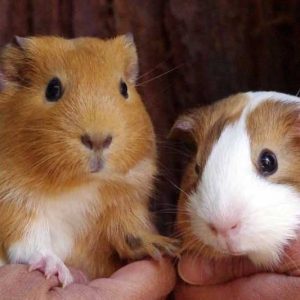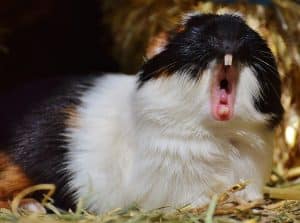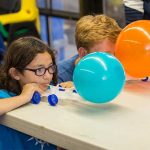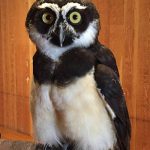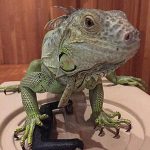Blog
Guinea Pigs
Their teeth are always growing, and they’re a relative of the capybara…. this blog is all about Guinea pigs, and why they make great Animal Ambassadors! Highlight: meet a Guinea pig at our March 2, 2018 First Friday Family Night from 5-8pm.
What is a Guinea pig?
The Guinea pig, Cavia porcellus (a.k.a. ‘cavies’), is actually a small rodent without a tail. Guinea pigs originated in South America. So… not a pig, and not from Guinea, West Africa. Why are they named Guinea pigs? As Nat Geo explains in this clip, it was probably a mix up!
Like other rodents, their teeth will keep growing continuously… so you’ve got to give them many opportunities to chew. With unique personalities and vocal calls (squeaks, chirps, chattering…), the Guinea pig can be found in many homes, pet shops and rescue centers throughout California. Their average lifespan in captivity is about 8 years old, but some have lived into their teenage years.
Fun fact: there are 13 different breeds of Guinea pigs! Check out their different hairstyles and color variations here.
Where are Guinea pigs found in the wild?
Trick question; they aren’t. That’s right, Guinea pigs are actually extinct in the wild. More on that below.
What topics do Guinea pigs help facilitate?
Quite a few; for starters:
- An introduction to animals
- Guinea pigs are common pets, so they are great for children who may be scared of other more ‘wild’ Animal Ambassadors (like a snake or tarantula). A familiar face can make a big difference! Even if you haven’t seen them before, they’re fuzzy and inviting. Lucky for us, some Guinea pigs don’t mind being petted so children often get to interact with them directly.
- Human influence & conservation
- The human role in wild Guinea pig extinction can lead to a talk about conservation. Back in the day (9000 b.c.), Guinea pigs were quite adaptable to many environments. In 5000 b.c. however, Guinea pig domestication began. Soon after European colonization of South America, Guinea pigs (and specialized Guinea pig breeding) spread worldwide. Guinea pigs as pets and food led to their extinction in the wild.
- Animal adaptation
- Guinea pigs are adapted to a grassland lifestyle. How might their characteristics or tools (like ever-growing teeth or vocal communication ability) help them survive in the wild?
- Predator & prey/animal defenses
- We can talk about common Guinea pig habits, and how those habits may have helped them survive in the wild. For example, two common Guinea pig habits are “the immobility response” (stopping all movement) and “the scatter response” (quickly scattering away).
- Rescues & animal care
- Our Guinea pigs are rescued (previous pets). We can choose to highlight all the animals out there who need stable forever homes after their original families could no longer care for them. Some shelters are packed with Guinea pigs who need stable homes.
- Families often view Guinea pigs as a great beginner pet for kids, but Guinea pigs actually come with a lot of requirements! We can talk about their special care (and ability to poop, alot) during these talks so potential adopters can dispell or confirm any myths they may have heard.
I want to learn more about Guinea pigs, where do I start?
We have Guinea pigs at CuriOdyssey; they are Animal Ambassadors who make special appearances at different ‘Animals in Action’ talks daily. Give us a call at 650-342-7755 during open hours to see if our Guinea pigs are scheduled for the day. You can also check out the below websites for more info about Guinea pigs! Bonus: many Guinea pig owners post fun videos on YouTube. Always do your research before bringing home any animal as a pet.
- Animal Diversity Web (used for the info in this very blog)
- The Humane Society & PetFinder
- Nat Geo & PetSmart
Find out how to symbolically adopt our Guinea pigs here.
As always, thank you for your curiosity!
Join us online. #CuriOdyssey #SciencePwr
Join the CuriOdyssey Community
LOCATION
1651 Coyote Point Drive
San Mateo, CA 94401
Ohlone Land Acknowledgement
650-342-7755
[email protected]
CuriOdyssey is a 501(c)(3) nonprofit, Tax ID 94-1262434


